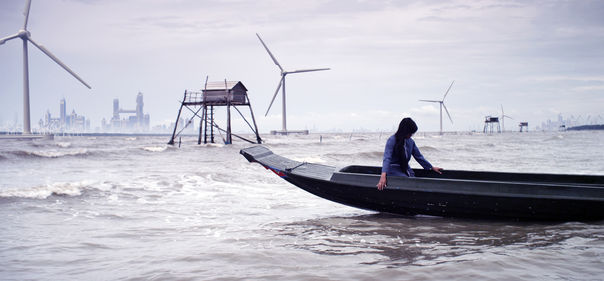One film, two reviews: NUOC
Two opinions on a compelling Vietnamese global warming thriller from the Berlinale Panorama: NUOC by Nguyễn-Võ Nghiêm-Minh, watched and reviewed by two Talent Press critics.

NUOC by Nguyễn-Võ Nghiêm-Minh
Centering Humanity
By Tara Judah
Imagining what the world will look like, just sixteen years into the future, as the effects of global warming impress upon the environment, Nguyễn-Võ Nghiêm-Minh presents an unsettling vision of an unstable horizon. Against this science-fiction backdrop he posits questions of love, humanity and truth. Exploring contemporary concerns about the role of science and technology in global sustainability, Nguyễn-Võ looks at the world through an inquisitive and uncertain lens. Constantly shifting its perspective, the camera follows Sao (Quynh Hoa), a woman torn between two lovers, trying to find equilibrium.
In Vietnam, not far from Ho Chi Minh City, close to eighty per cent of the population has been evacuated. With most of the land submerged by rising sea levels, those who have stayed behind are cultivating new life and much-needed hope on floating food farms. Sao and her husband Thi (Kim Long Thach) however, have stayed out of loyalty to their ancestors' submerged land, with hope that the sea levels will fall. Following their failed attempts at self-sufficiency, Thi finds work at the local food farm, under the employment of Sao's past lover, Giang (Quy Binh). After two days on the job, Thi is found dead. The circumstances are suspicious and, determined to uncover the truth, Sao goes to work for Giang.
The first images we see of the city submerged are shown from overhead. The observational bird's-eye-view quickly turns and places the viewer at an uncomfortable forty-five degree angle, askew to the horizon. Turning again, the camera takes up a traditional, frontal perspective. Though this third perspective does not necessarily represent truth, it is a familiar axis of alignment in narrative cinema. As such, it is the view Nguyễn-Võ repeatedly returns to, following his intermittent perspective divergences and jarring Dutch tilts.
Framing perspective in this way is a visual mirroring of Sao’s state of mind as she repeatedly questions the death of her husband. The visual dynamism is expertly matched with the narrative arch and is, ultimately, what makes this film so compelling. Through an inversion of style, Nguyễn-Võ skilfully brings significant contemporary social and political concerns back to an easily relatable, precise point of humanity, something the film reveals as ever-present, regardless of the shifting axis.
Breaking the Waves
By Dasha Lisitsina
NUOC, Nguyễn-Võ Nghiêm-Minh’s sci-fi love story set in a flooded future Vietnam, comes on the receding tide of the recent wave of films that use the widescreen to play out an epic of minutiae – a detailed character study of man against nature (GRAVITY, CAPTAIN PHILIPS, ALL IS LOST). Although these films have a few good pure spectacles, the focus is more on the sweat on the brow of the main character. NUOC zooms in from 360° fish-eye shots of seascapes to close-ups of the protagonist's forever-swaying hair. Indeed, waves and swaying is all that the film is. The soundscape is intricate and all consuming: we either hear or see waves throughout most of the film. Their rhythmic beat has a hypnotic, immersive effect and the film succeeds in creating an experiential viewing. However, the psychological drama of living in extraordinary circumstances is not taken far beyond its premise. The main actress delivers a compelling performance, but the characters themselves are not given much depth. They are cardboard cut outs floating around willy-nilly.
While the intricacies of the love-triangle are played out subtly, the murder-mystery drama feels unconvincing and unnecessary to the dramatic effect of the film. As a narrative, there is enough dramatic potential without it. Scenes where the film gets bogged down in the practicalities of growing plants in post-apocalypse life become throwaway after-thoughts to sustain the initial cinematic concept, a concept that is strong and clear enough visually that it doesn't need to be explained so explicitly. At times the film starts to feel like a science lesson, the fictional version of the sensationalist pseudo-documentary about global warming, AN INCONVENIENT TRUTH. The opening inter-titles explain the effects of global warming with all the charm of a biology textbook and, as a result, the subsequent, more-or-less endearing film, can at times feel like a demonstration of a theory, rather than a narrative in its own right. What started out as a promising film descended into a TITANIC-inspired ending, set to an elevator music soundtrack.

